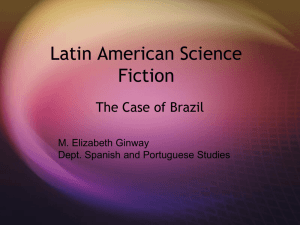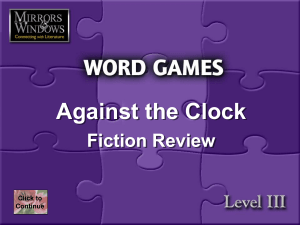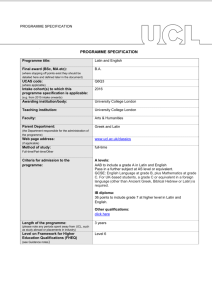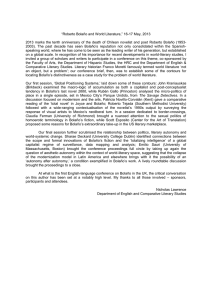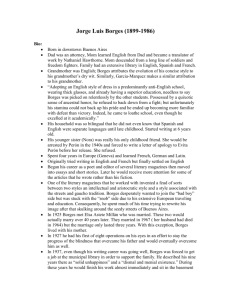university of kent – code of practice for quality assurance MODULE
advertisement
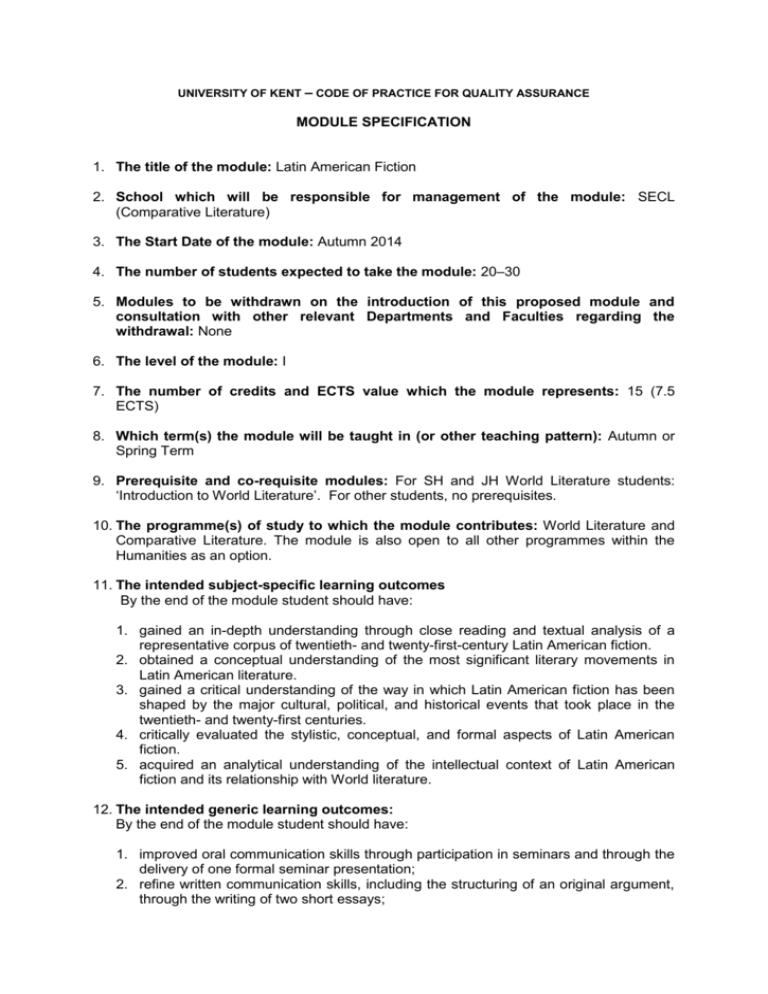
UNIVERSITY OF KENT – CODE OF PRACTICE FOR QUALITY ASSURANCE MODULE SPECIFICATION 1. The title of the module: Latin American Fiction 2. School which will be responsible for management of the module: SECL (Comparative Literature) 3. The Start Date of the module: Autumn 2014 4. The number of students expected to take the module: 20–30 5. Modules to be withdrawn on the introduction of this proposed module and consultation with other relevant Departments and Faculties regarding the withdrawal: None 6. The level of the module: I 7. The number of credits and ECTS value which the module represents: 15 (7.5 ECTS) 8. Which term(s) the module will be taught in (or other teaching pattern): Autumn or Spring Term 9. Prerequisite and co-requisite modules: For SH and JH World Literature students: ‘Introduction to World Literature’. For other students, no prerequisites. 10. The programme(s) of study to which the module contributes: World Literature and Comparative Literature. The module is also open to all other programmes within the Humanities as an option. 11. The intended subject-specific learning outcomes By the end of the module student should have: 1. gained an in-depth understanding through close reading and textual analysis of a representative corpus of twentieth- and twenty-first-century Latin American fiction. 2. obtained a conceptual understanding of the most significant literary movements in Latin American literature. 3. gained a critical understanding of the way in which Latin American fiction has been shaped by the major cultural, political, and historical events that took place in the twentieth- and twenty-first centuries. 4. critically evaluated the stylistic, conceptual, and formal aspects of Latin American fiction. 5. acquired an analytical understanding of the intellectual context of Latin American fiction and its relationship with World literature. 12. The intended generic learning outcomes: By the end of the module student should have: 1. improved oral communication skills through participation in seminars and through the delivery of one formal seminar presentation; 2. refine written communication skills, including the structuring of an original argument, through the writing of two short essays; 3. developed the ability to read texts closely and critically, and to apply a range of critical terms to literary texts; 4. honed the ability to undertake the critical analysis of literature. 13. A synopsis of the curriculum: This course introduces students to the fiction (novels, novellas, and short stories) of some of the most influential twentieth- and twenty-firstcentury Latin American writers. The module ranges from Borges to the extraordinary literary phenomenon or explosion of the ‘Boom generation’, the post-Boom novel, and the recently acclaimed Chilean writer Roberto Bolaño (all studied in English translation). The course offers students the unique opportunity to study a fascinating corpus of literature celebrated for its creative innovation, fictional games, puzzles, labyrinths, fabulous and supernatural events, multiple storytellers, and magical realist writing. The course also addresses questions of gender, class, and social, cultural, and technological changes, as well as representations of identity, subjectivity, time, space, and landscape. 14. Indicative List: Jorge Luis Borges, Labyrinths Juan Rulfo, ‘The Burning Plain’ Carlos Fuentes, Aura Gabriel García Márquez, One Hundred Years of Solitude Julio Cortázar, All Fires the Fire and Other Stories Horacio Quiroga, Stories of Love, Madness and Death Mario Vargas Llosa, Aunt Julia and the Scriptwriter Silvina Ocampo, Selected stories Manuel Puig, Heartbreak Tango Roberto Bolaño, The Skating Rink 15. Learning and Teaching Methods, including the nature and number of contact hours and the total study hours which will be expected of students, and how these relate to achievement of the intended learning outcomes: Study Hours: One weekly two-hour seminar for ten weeks Contact Hours: 20 Total Study Hours: 150 Seminars will generally include a presentation by small groups of students. Having completed the preparatory reading for each week’s seminars, students will be in a position to contribute to seminar discussions, which will include focusing in detail upon particular extracts from each of the works under consideration and well as considering the broader cultural context. This will encourage the development of close-reading skills. These learning and teaching methods will contribute to achieving Learning Outcomes 11.1-5 and 12.1-4 16. Assessment methods and how these relate to testing achievement of the intended learning outcomes: All students will give one in-class presentation (20 minutes) on one or more of the texts being studied (20%) and complete two essays of 1500 words each (40% each). The in-class presentation will assess Learning Outcomes: 11.1-5 and 12.2-4 The essays will assess Learning Outcomes: 11.1-5 and 12.1, 3-4 17. Implications for learning resources, including staff, library, IT and space: None 18. The School recognises and has embedded the expectations of current disability equality legislation, and supports students with a declared disability or special educational need in its teaching. Within this module we will make reasonable adjustments wherever necessary, including additional or substitute materials, teaching modes or assessment methods for students who have declared and discussed their learning support needs. Arrangements for students with declared disabilities will be made on an individual basis, in consultation with the University’s disability/dyslexia support service, and specialist support will be provided where needed. 19. Campus(es) where module will be delivered Canterbury. Statement by the Director of Learning and Teaching: “I confirm that I have been consulted on the above module proposal and have given advice on the correct procedures and required content of module proposals.” ___________________________ Director of Learning and Teaching ___________________ Date Statement by the Head of Department: “I confirm that the Department has approved the introduction of the module and will be responsible for its resourcing.” ___________________________ Head of Department ___________________ Date

